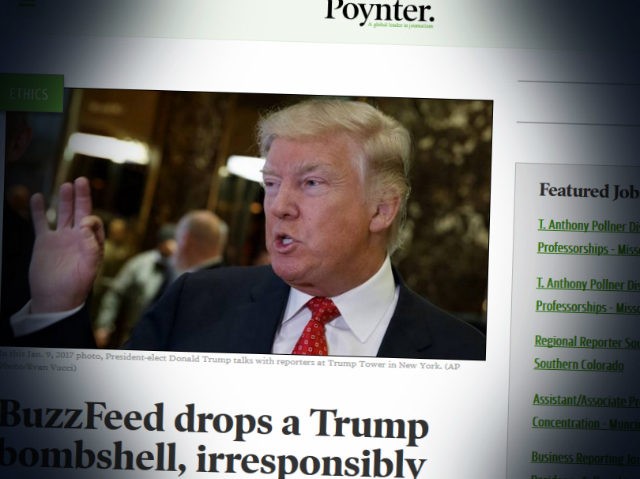The Poynter Institute, the group helping Facebook determine whether certain news stories are “disputed,” has slammed BuzzFeed for “irresponsibly” publishing in full an alleged intelligence report claiming Russia possesses blackmail dirt on Donald Trump.
“BuzzFeed drops a Trump bombshell, irresponsibly,” was the title of the Poynter piece authored by media ethicist Kelly McBride, who serves as Poynter’s vice president for academic programs.
“The act of publishing the dossier in its entirety isn’t journalism,” McBride chided.
McBride wrote:
BuzzFeed Editor-in-Chief Ben Smith explained his choice to publish the dossier in a memo to the newsroom Tuesday, arguing the decision reflects “the job of reporters in 2017.”
That’s certainly what Wikileaks does. But publishing an entirely unvetted document is a significant departure from the way editors of most significant publications would define the role of reporting.
Sure, editors everywhere get queasy when they consider withholding information from the public. But historically, when editors have wrestled with this challenge, they agonized over information reporters had already vetted.
The Poynter writer provided a list of sentences that she states she wished BuzzFeed had included in an editor’s note inside the site’s article containing the full report:
“Here’s what we are doing to verify or debunk the claims…”
“Here’s a list of the people that helped us identify the harm we might cause in publishing this…”
“Here are the most important facts we’ve already independently verified…”
McBride lectured, “Vetting the document and determining its veracity? That’s the work of journalists in 2017, or any other year.”
BuzzFeed on Tuesday published an un-redacted document of mysterious origin purporting to be an intelligence report alleging that Russia had collected compromising videos and information on Trump.
“The allegations are unverified, and the report contains errors,” a BuzzFeed sub-headline cautioned.
However, BuzzFeed’s publication of the document prompted a flurry of news media reports drawing attention to the salacious and unproven details. CNN fanned the flames by reporting that “classified documents” presented to President Obama and Trump included “allegations that Russian operatives claim to have compromising personal and financial information” on Trump, the news network claimed, citing “multiple US officials with direct knowledge of the briefings.”
The International Fact-Checking Network (IFCN), which is a project of the Poynter Institute, drafted a code of five principles for news websites to accept, and Facebook last month explained it will work with “third-party fact-checking organizations” that are signatories to the code of principles.
Facebook says that if the “fact checking organizations” determine that a certain story is fake, it will get flagged as disputed and, according to the Facebook announcement, “there will be a link to the corresponding article explaining why. Stories that have been disputed may also appear lower in News Feed.”
Aaron Klein is Breitbart’s Jerusalem bureau chief and senior investigative reporter. He is a New York Times bestselling author and hosts the popular weekend talk radio program, “Aaron Klein Investigative Radio.” Follow him on Twitter @AaronKleinShow. Follow him on Facebook.

COMMENTS
Please let us know if you're having issues with commenting.